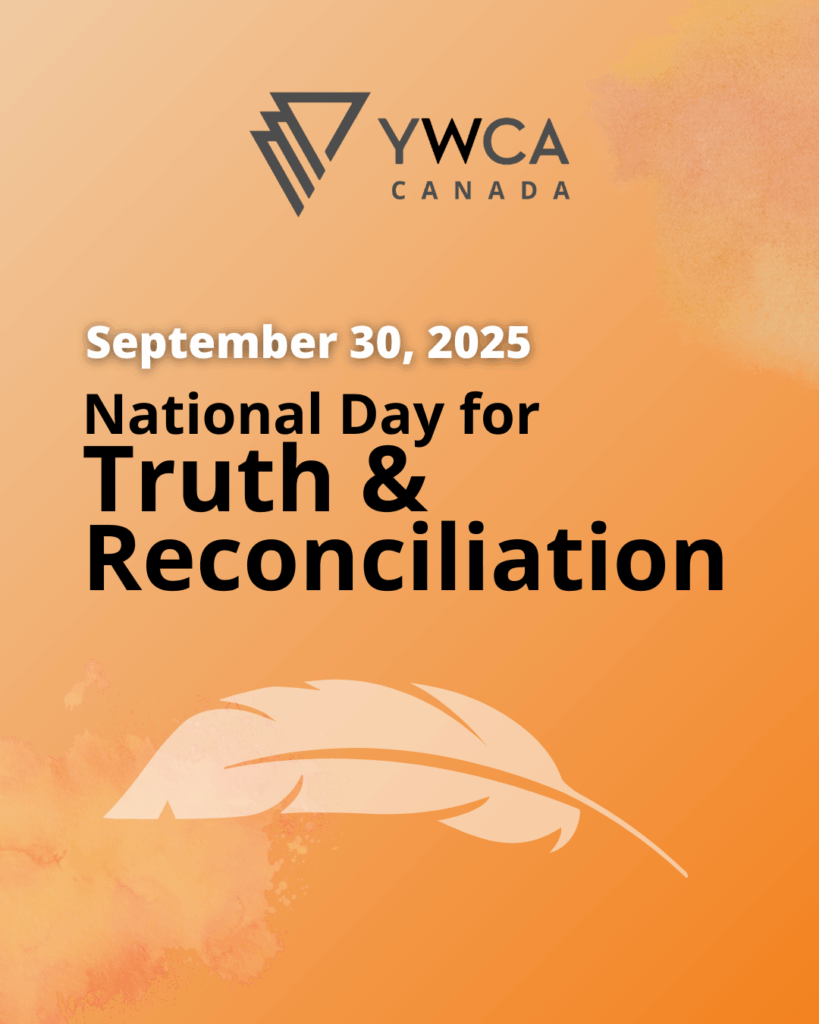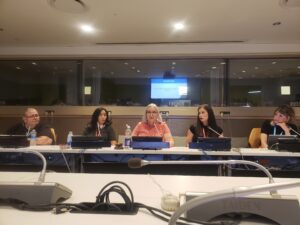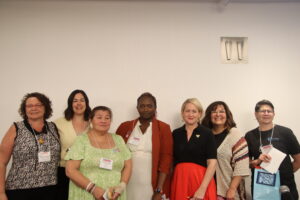Today is Orange Shirt Day and the National Day for Truth and Reconciliation, and we are reflecting on our ongoing truth and reconciliation process. These moments of national recognition are not only opportunities to honour survivors, families and communities, but also to reaffirm our commitment to meaningful action.
In 2024, we took an important, long overdue step by issuing a public apology for YWCA’s historical involvement in residential schools and Indian Hospitals. This came after commissioning research by Dr. Kristin Burnett and Dr. Shannon Stettner, which revealed YWCA Canada and its branches supported colonial practices and assimilation policies. The release of the summary of that report (full report available upon request at reconciliation@ywcacanada.ca) marked a moment of reckoning and laid the groundwork for deeper relationship-building, accountability and redress. We’ve described it as a “preliminary” report because it’s one step in a continuous practice.
What Came Next
The release of the apology and summary report was not an end point, but a beginning. Since then, our efforts have focused on relationship-building, knowledge-sharing, and creating the conditions for the development of a co-created Reconciliation Action Plan—one led by Indigenous voices and grounded in lived experience.
YWCA Canada socialized the full report with staff, volunteers and external partners, prioritizing communities named in the report. We’ve responded to dozens of requests from community members, archivists, researchers and academics. With gratitude to Elder Nina Wilson, we have offered Indigenous readers access to cultural support to process the information in ceremony or one-on-one through a trauma-informed, culturally responsive dialogue.
Centering Indigenous Leadership and Building Deeper Relations
- In January, we met with the Sixties Scoop Network to hear their insights on the report’s significance and plan for a gathering, which will offer a safe space to continue this important dialogue.
- In March, National CEO Aline Nizigama met with Tk’emlúps te Secwepemc Nation Council to discuss the implications of the report’s findings to support their ongoing efforts on behalf of Le Estcwicwéy (The Missing).
- In April, we jointed the Indigenous Prosperity Foundation (IPF) in co-hosting a powerful panel at the United Nations Permanent Forum on Indigenous Issues (UNPFII), featuring voices from within the YWCA network and beyond. The five speakers shared their experience as Indigenous women in leadership.

- We continue to convene with YWCA Canada’s Indigenous Circle as a safe space for YWCA Indigenous staff and volunteers and Truth and Reconciliation Action Committee (TRAC) to help shape our forthcoming Reconciliation, Accountability and Inclusion Strategy (RAIS). Based on federation-wide input, the RAIS will offer a roadmap to build relationships, take accountability and act in solidarity with Indigenous communities.
Ongoing Learning and Community Engagement
Throughout the spring and summer:
- YWCAs across the country observed Red Dress Day, honouring Missing and Murdered Indigenous Women, Girls and Two-Spirit people and their families.
- At our Annual Members Meeting in May, we hosted a panel “From Elders-in-Residence to Land-Based Learning: Reconciliation in Action,” highlighting community-led models of reconciliation work happening at the local level.

- During Indigenous History Month in June, we amplified Indigenous voices and continued learning as a team, committing to joining Native Child and Family Services of Toronto for their Annual Powwow in the Fall.
Looking Ahead
As we prepare to launch the Reconciliation, Accountability and Inclusion Strategy (RAIS) this fall, we’re setting a path that will guide the National Office as we respond to the 94 Calls to Action and 231 Calls for Justice. The strategy will help us build and strengthen relationships with Indigenous-led organizations, support the local work of YWCAs, and strive to meet benchmarks for recruitment, retention, procurement, and policy development.
A Long-Term Commitment
Reconciliation is not a project with a fixed end date. It is a sustained, evolving commitment. This work is central to our mission and to our new strategic plan, Centering Excellence and Equity. Reconciliation, anti-racism and equity (RAE) are not add-ons. They are at the core of how we advance gender equity and justice in Canada. We will continue to actively prioritize and resource efforts that advance our RAE commitments — work that is led by and informed by, equity-deserving communities.
We are humbled by the road ahead, and we remain committed to walking it with care, courage, and accountability.
“Truth-telling is a foundational, non-negotiable part of reconciliation. At YWCA Canada, we honour our promise to speak the truth about our history and its impacts, while working to repair relationships, stand in solidarity with Indigenous people and progress in our reconciliation efforts through sustained action.” – Aline Nizigama, YWCA Canada’s National CEO
How our local YWCAs are advancing Truth and Reconciliation
Educational Resources
- Decolonial Toolkit by Montreal Indigenous Community
- Indigenous Ally Toolkit by Montreal Indigenous Community
- Built for Zero Canada’s Resources on Homelessness in Indigenous Communities.
- United Way Calgary’s Resource List
- Native Women Association of Canada’s Knowledge Centre
National and Feminist Indigenous-Led Organizations:
Resources for Support:
- 24-Hour National Indian Residential School Crisis Line: Call 1-866-925-4419
- Hope for Wellness Help Line: Call 1-855-242-3310 or chat online at www.hopeforwellness.ca
- Native Women’s Association of Canada (NWAC): Visit www.nwac.ca
- Suicide Crisis Helpline: Call or text 9-8-8
- Indigenous Friendship Centres: Providing culturally safe spaces and access to mental health services in urban areas
- Contact YWCA Canada: reconciliation@ywcacanada.ca


